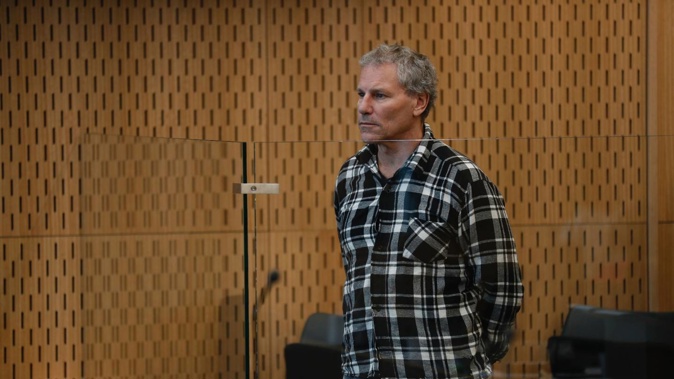
Colleagues of a convicted killer on life parole were not informed of his criminal history until after they discovered a news article about being a groomsman at David Bain’s wedding.
It has also emerged the officers who processed him for drink-driving the night before the second killing were unaware he was a life parolee.
Paul Russell Wilson lay in wait for eight hours overnight, before Nicole Marie Tuxford, 27, arrived back in her Merivale home in April, 2018.
Wilson, also known as Paul Tainui, was sentenced in 2019 to life imprisonment for raping and killing Tuxford, with a minimum non-parole period of 28 years.
/cloudfront-ap-southeast-2.images.arcpublishing.com/nzme/7DWOZ5LMOPES3H5NOVPN4B3MZM.jpg)
Nicole Tuxford was killed in her Merivale home in 2018. Photo / File
The shocking news that Wilson committed a second murder – 24 years after he murdered former girlfriend Kimberly Schroder in Hokitika – was too much for Schroder’s father.
Gary James Schroder, 67, died in a suspected suicide just hours after Wilson made his first court appearance.
A joint inquest is under way in Christchurch before Coroner Marcus Elliot.
The central issues of the inquiry relate to the Department of Corrections identification and management of risk of reoffending.
- How killer Paul Wilson escaped rape charge
- 'Monster of a man' jailed for second rape and murder
- David Bain professes shock over Paul Wilson's crimes
On Tuesday, Detective Inspector Scott Anderson, the officer in charge of the investigation into Tuxford’s death gave evidence.
/cloudfront-ap-southeast-2.images.arcpublishing.com/nzme/5V6BFQP22W3Q53LFZIVOOCELRY.jpg)
Groomsman Paul Wilson, left, with newly married couple David Bain, right, and Liz Davies, centre, after their wedding ceremony in Christchurch. Photo / Supplied
After his release from prison Wilson was assisted by a charitable group who helped him find a job at a workplace in Christchurch in 2016.
The directors of the company decided to keep Wilson’s criminal history quiet to start with so they could get to know him.
About four months later one of the directors helped Wilson change his name.
In December 2017 Wilson offered his resignation, the charitable group and his parole officer were contacted. After a meeting Wilson revoked his resignation.
Management at his workplace, which has name suppression, encouraged Wilson to get a pet believing it would help him feel responsible for something.
After six months it was brought to the management’s attention he had conflict with a supervisor which was referred to the charitable group. Wilson was diagnosed with being institutionalised and a reluctance to change. He was referred to counselling.
On another occasion Wilson became angry when an employee challenged him about doing electrical work at Tuxford’s home. Tuxford was advised against allowing him to do that work as it may compromise her insurance.
A director told Wilson he should not be going to a young female’s home while on parole. He conceded it was “probably not a wise move”. Wilson’s criminal history was still not disclosed.
It was not until a colleague saw a news article about Bain it became known that Wilson had a criminal past. The directors then decided they should make employees aware and there was a full staff meeting.
A few months later management became aware Wilson was socialising with employees outside work.
On April 5, 2018 Wilson arrived at work late and said his cat had run away. The following day he told a colleague had been “kicked in the guts” by someone he trusted.
“I just want to lock myself away from the world”, he said.
He said he would raise this with his probation officer the following week.
As part of the police investigation officers spoke with several of Wilson’s colleagues.
They reported that on Valentine’s Day in 2017 Wilson sent flowers to Tuxford at the office. On St Patrck’s Day the following year the group were at a bar when Wilson left after Tuxford dance with another colleague.
Several employees noticed Wilson was “jealous” about some things Tuxford had done, and relationships she had with other employees.
Tuxford told one colleague the pair were just friends and that nothing was going to happen.
However, Wilson had told one of his friends in March 2018 that Tuxford was “showing an interest in him”.
Then, prior to the killing, Wilson called his friend in a low mood and said he had been in an intimate relationship with Tuxford for the last 18 months and had just found out she was in a relationship with someone else.
Anderson earlier discussed what information pertaining to Wilson’s risk was shared between police and Corrections.
From Wilson’s release from prison in 2011 until Tuxford’s death in 2018 there were 10 entries relating to him in police’s intelligence system.
The first was in May 2012 when he was involved in a minor crash. In 2014 he was involved in two further crashes, one of which resulted in him being convicted on two charges of careless driving causing injury, fined and ordered to pay reparation.
The third crash occurred near Christchurch Airport. Police were later informed the crash happened while Wilson was on his way to a neurologist about a suspected seizure. No information about the crashes was shared by police to Corrections.
In June 2016 police told Corrections that Wilson had been banned from a Christchurch bar after patrons found out about his first murder.
Two months later information was shared between police and Corrections regarding an incident between Wilson and a woman he met at a bar and had a brief relationship with. On this occasion it was determined Wilson was the victim and the woman was trespassed from his home.
Later that year Wilson changed his name and moved address. In 2017 he was granted a second-hand dealers certificate, and he was also involved in another minor traffic crash. He was summonsed to a community panel and given a warning for travelling too close. There was no record that the information about the fourth crash was shared with Corrections.
/cloudfront-ap-southeast-2.images.arcpublishing.com/nzme/CALBVME2DJBSVEXVSX3AKHMQUM.jpg)
Detective Inspector Scott Anderson giving evidence at the joint coronial inquest for Nicole Tuxford and Gary Schroder.
On the night of Tuxford’s killing Wilson was stopped by a police booze bus and failed a drink-drive test.
Police took his keys and he was issued a court summons. He was not allowed to take with him two large knives locked in the car’s boot.
While processing Wilson one of the officers checked in on the National Intelligence Application and saw an alert on his profile.
The officer had checked Tainui’s criminal history earlier and discovered his previous murder involved a “stabbing/cutting weapon”.
It was also noted he had two release conditions – not to visit the West Coast or have any contact with any victims of his first offending or witnesses.
Anderson said that following Tuxford’s death it was clear there was no process set out in how life parolees were identified by police and subsequent action that was required to be taken.
Anderson said that as of November 11 this year there were 460 life parolees in the community nationwide.
A project between police and Corrections with input from the New Zealand Parole Board developed a process where police and Corrections could have means for sharing information when dealing with life parolees in the community.
When dealing with Wilson the only information the officers had accessible was that he had a conviction for murder and two release conditions. Now, the system has an alert for a life parolee and sets out what action is to be taken.
If they are to be arrested then Corrections is advised who then decided if a recall application is to be made.
As soon as police interact with a life parolee an intel noting is entered which automatically gets sent to Corrections. Since the process more than 40 recall applications have been granted.
Anderson gave several examples that showed the information sharing appeared to be working well where life parolees had been recalled.
As a result of the homicide investigation, a member of the public said they reported concerns about Wilson via the Canterbury Police Facebook Page in 2015.
The information was never actioned by police, or sent to Corrections.
The Independent Police Conduct Authority later commented that the information was “sufficiently concerning” to have warranted police making further inquiries.
Police’s Facebook messenger now has an auto reply telling people not to report crimes through messenger.
The inquest continues.
Take your Radio, Podcasts and Music with you









